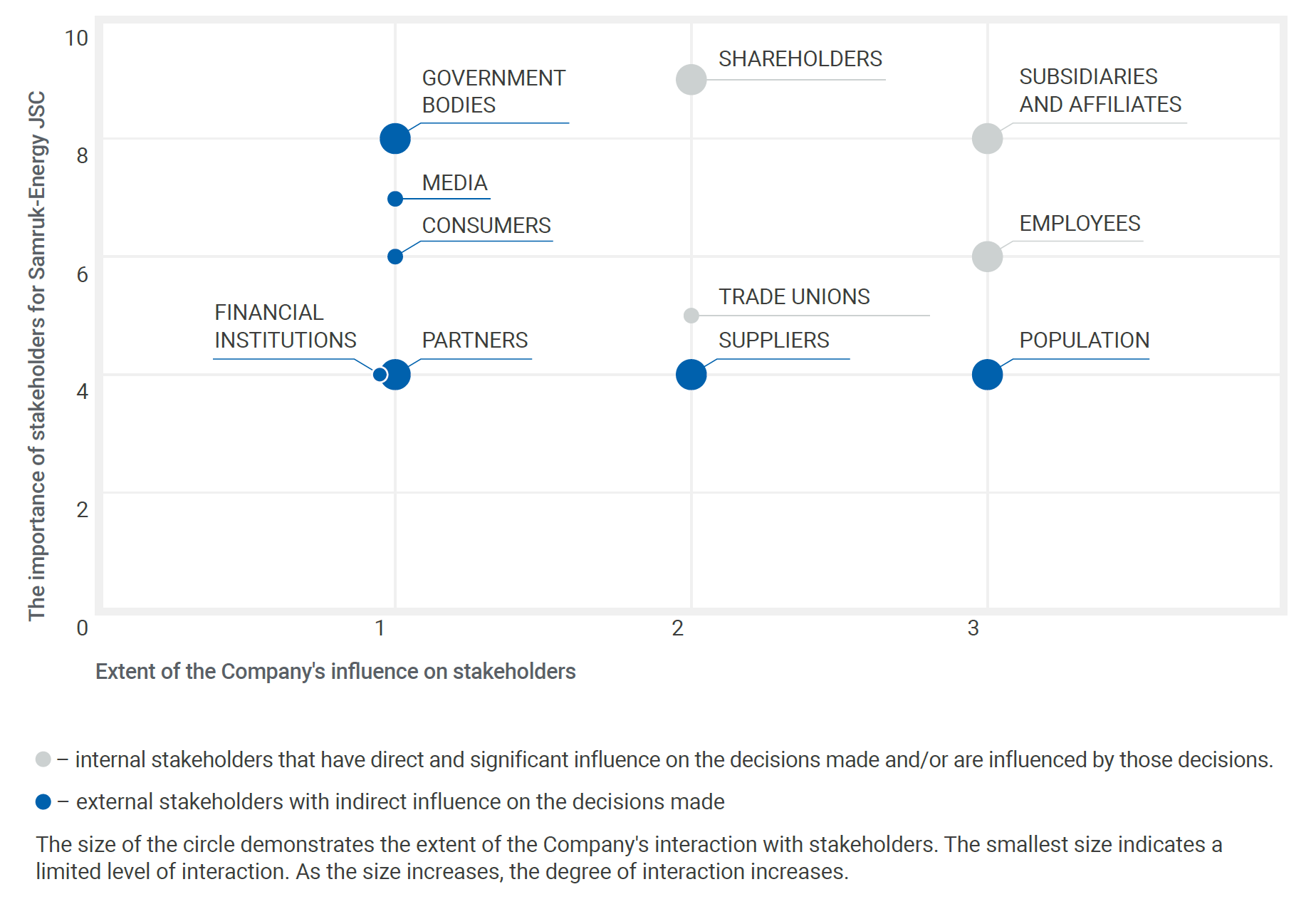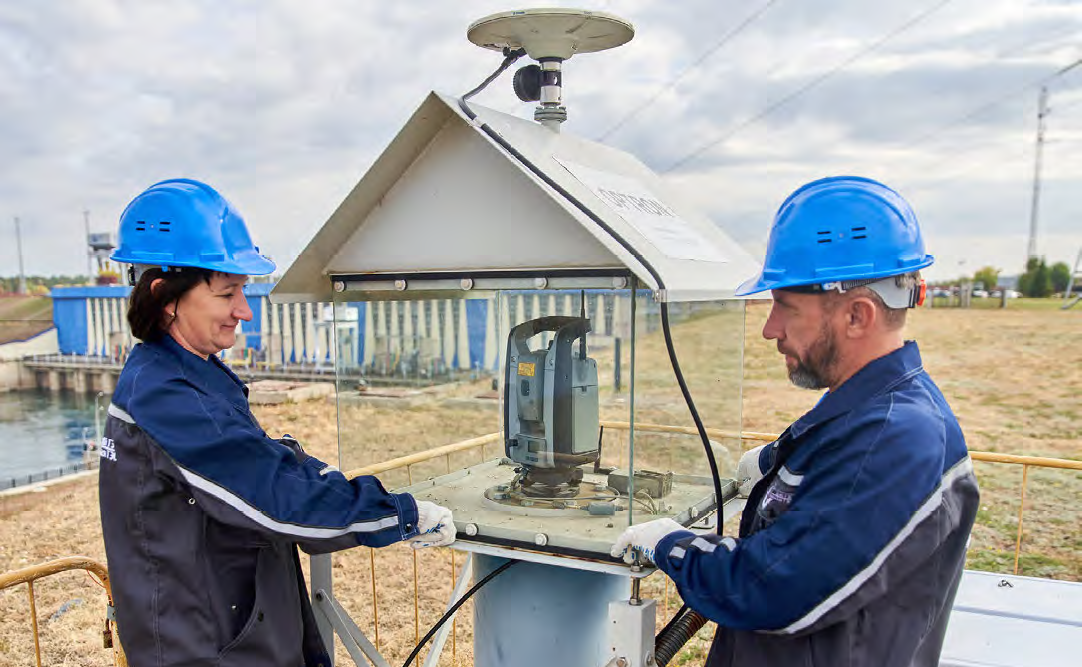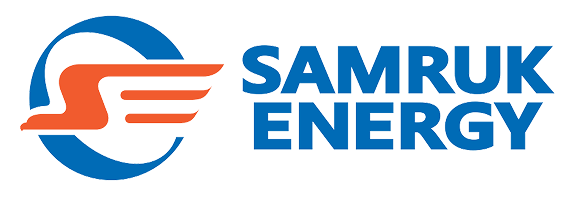Stakeholder engagement
Stakeholder engagement is a key element of our approach to doing business. This approach fosters trust and transparency, helping us to better understand external changes, market expectations and new opportunities and risks.
Systematic work with stakeholders and analyses of their views on economic, social, environmental, ethical, and human rights issues allow us to take into account their needs and effectively manage both direct and indirect impacts on Samruk-Energy JSC. This strategic approach helps build long-term relationships with key partners, prevent or mitigate negative consequences and ensure business success. By creating value for all stakeholders, including employees, customers and society as a whole, we develop a sustainable business model that links success with the well-being of the entire ecosystem.
Guided by the best international practices in the field of stakeholder engagement (AA1000 series standard, GRI), the Company applies a number of principles to build effective stakeholder engagement, which allow it to take into account the interests of all stakeholders at all stages of the Company's operations management process.
We identify the key stakeholders with whom we interact within the framework of our activities. To assess their importance, we use the Mitchell, Agle and Wood model, dividing stakeholders into internal and external groups. Based on the analysis and identification, we form a Stakeholder Map, including the most important groups for the Company. This approach allows us to take into account their expectations and build long-term partnerships.
Basic principles of stakeholder engagement:
- respecting and taking into account the interests, opinions and preferences of stakeholders;
- timely and regular informing of stakeholders;
- responsible fulfilment of the obligations undertaken.
We regularly gather stakeholder views, inviting them to discuss critical issues and strategic priorities. This is done by setting up special groups to assess the impact of our business on stakeholders and identify key aspects to manage.
We have various channels of stakeholder engagement working across departments and teams. This includes information and feedback from day-to-day operations.
We are committed to transparency and ethics in our stakeholder engagement. Our Business Principles set clear standards of integrity, respect and responsibility. With transparency in mind, as part of our stakeholder engagement, we review the balance and completeness of the information disclosed in the annual report, and identify topics and issues that have a material impact on the Company and its stakeholders each year after the issuance of the annual report.
We ensure responsible and sustainable business conduct through a comprehensive corporate governance framework, including regularly updated policies and a Human Rights Policy.
We emphasise open communication and encourage feedback, responding promptly to issues as they arise. Our employees receive in-depth training on data protection, non-discrimination and privacy, which fosters a culture of trust.
External audits confirm our commitment to high ethical standards, providing stakeholder confidence in our operations. In a changing business landscape, we remain flexible, building trust through transparent and responsible practices.
All such activities are included in the Stakeholder Engagement Plan, which is based on the Stakeholder Map of Samruk-Energy JSC and the practice of stakeholder engagement. The Plan also describes the principles of the Company's stakeholder engagement, approach to identification and analysis of stakeholders, requirements to stakeholder engagement, mechanisms for filing and reviewing complaints, and stakeholder engagement activities. The Company monitors the implementation of the Plan, and the results are reported to the Board of Directors.
The Strategy of Samruk-Energy JSC for 2024–2034 is based on the principles of sustainable development enshrined in the UN Global Compact and, in particular, includes building a map of stakeholders and methods/ channels of interaction. In 2024, the activities of the Stakeholder Engagement Plan of Samruk-Energy JSC were fulfilled in full. In accordance with the Plan, subsidiaries and affiliated organisations of Samruk- Energy JSC in 2024 monitored the approved Stakeholder Engagement Plans (SEP) for existing investment projects.
Map of Samruk-Energy JSC stakeholders

Engagement with key stakeholder groups
| Stakeholder's interest in the Company | Engagement mechanisms | Engagement results |
|---|---|---|
| Internal | ||
| Shareholder | ||
|
|
Detailed information is provided in the Corporate Governance section |
| Management and personnel | ||
|
|
Detailed information is provided in the ESG Aspects Management section |
| Subsidiaries and associates | ||
|
|
Detailed information is provided in the sections Performance Indicators, ESG Aspects Management, Corporate Governance |
| Trade unions | ||
|
|
Detailed information is provided in the ESG Aspects Management section |
| External | ||
| State authorities | ||
|
|
Detailed information is provided in the sections ESG Aspects Management, Corporate Governance |
| Consumers | ||
|
|
Detailed information is provided in the Strategic Report section |
| Suppliers of goods, works and services | ||
|
|
Detailed information is provided in the sections Performance Indicators, ESG Aspects Management |
| Business communities (Associations, National Chamber of Entrepreneurs, NGOs) | ||
|
|
Detailed information is provided in the sections Strategic Report, Performance Indicators |
| Public organisations and local communities | ||
|
|
Detailed information is provided in the ESG Aspects Management section |
| Partners | ||
|
|
Detailed information is provided in the sections Strategic Report, Performance Indicators |
| Financial institutions | ||
|
|
Detailed information is provided in the sections Strategic Report, Performance Indicators |
| International organisations | ||
|
|
Detailed information is provided in the sections Strategic Report, Performance Indicators |
| Creditors | ||
|
|
Detailed information is provided in the sections Strategic Report, Performance Indicators |
| Local executive bodies | ||
|
|
Detailed information is provided in the sections Strategic Report, Performance Indicators |
| Media | ||
|
|
Detailed information is provided in the ESG Aspects Management sections |

Cases 2024
Subsidiaries and associates
In 2024, the management of Samruk-Energy JSC conducted a number of working visits to production facilities of subsidiaries and affiliates. In addition, all subsidiaries and affiliates held reporting meetings with participation of the Company's management, the Ombudsman, representatives of trade unions and labour collectives, where issues of social and labour relations were discussed.
As part of the 2024 engagement, a general meeting was held to review the performance of S&As for 2023. In addition to this, 18 meetings of the CP&ED were held to review the performance of subsidiaries and affiliates.
The Company's management visited the enterprises of Alatau Zharyk Company JSC, EGRES-1 LLP, SEGRES-2 JSC, Bogatyr Coal LLP, Moynak HPP JSC, AlES JSC and other key assets.
Management and Personnel
In 2024, the Samruk-Energy JSC Group of companies held many events aimed at strengthening corporate culture and employee involvement. Employees took part in celebrations dedicated to state and professional holidays, sports competitions (spartakiade among employees of the Samruk-Kazyna JSC Group of companies) and a forum to promote gender diversity. The III Youth Forum of the Group of companies was also held.
To improve transparency and accessibility of information on vacancies for administrative positions in 2024, information was posted on the internal corporate portal with notification of employees by email. The portal is integrated with the unified online recruitment platform QSamruk.kz, providing access to current vacancies.
The Centre for Social Cooperation and Communications conducted quarterly surveys of social stability in the Group of companies. At the end of 2024, positive dynamics was noted:
- SRS index for Samruk-Energy JSC increased by 17%
- The engagement index increased by 16%
- Social well-being index increased by 35%
- Social tranquillity index increased by 15%
The research results confirm the growth of employee confidence and improvement of social conditions in the company.
As part of feedback with the staff, a reporting meeting of the Chairman of the Management Board of Samruk- Energy JSC with the employees of the corporate centre was held on 31 January 2024, where the results of work for 2023 and plans for 2024 were presented.
Public organisations and local communities
In 2024, the enterprises of the Samruk-Energy JSC Group of companies held public hearings on key environmental and social issues.
AlES JSC organised discussions on projects for modernisation of Almaty CHPP-2 and CHPP-3, emission standards and waste management. SEGRES-2 JSC presented the project of expansion and reconstruction of the plant. Ekibastuz SDPP-1 LLP held hearings on reconstruction of the cooling pond and modernisation of equipment to reduce emissions. AlmatyEnergoSbyt LLP discussed the upcoming change in electricity tariffs.
The hearings were held with the participation of local residents, government agencies and experts, ensuring that decisions were transparent and public opinion was taken into account.
Media
In 2024, interaction with mass media covered several key areas. Among them, the results of Samruk- Energy JSC's activities for the past year were covered, as well as information support of investment projects implementation and signing of agreements and contracts. Also, much attention was paid to the coverage of the Company's ESG initiatives.
Work with mass media included preparation and distribution of press releases on the activities of Samruk- Energy JSC and subsidiaries, as well as publications in the corporate edition “SK news”. An important part was placement of information materials on the official website of the Company and in social networks such as Telegram, Instagram and Facebook.
The Company also actively covered various corporate, sports and cultural events, including the final round of KVN, Spartakiade, Women's and Youth Forums. One of the directions was information support of the company's employees' participation in sports and cultural events organised by Samruk-Kazyna JSC, such as the charity race and the IX Spartakiade.
In addition, the company provided information support for management's working trips to energy facilities, as well as employees' participation in national and international forums and conferences. As part of the “Taza Kazakstan” environmental campaign, events were organised and several thematic videos were produced.
An important area was the creation of presentation videos about the company's activities, as well as information support for various contests, such as the children's drawing contest and the Best Production Specialist contest among employees. The press service also promptly responded to media enquiries and appeals, monitored materials and references about the company in the media and social networks, and updated information on the official website.
The press service of the Company prepared 85 materials published in the leading national and regional media, such as TV channels 24 KZ, Qazaqstan, KTK, newspapers Egemen Qazaqstan, Kazakhstanskaya Pravda and internet portals tengrinews.kz, zakon.kz, nur.kz and others. Also 21 interviews, 5 briefings and 6 press tours for journalists were organised.
The Company's official website posted 126 materials about key events, and 705 posts, infographics and videos were published on social media. Over the year, the number of followers on the Company's Telegram channel increased from 500 to 7,000, and on Instagram from 7,100 to 8,700, which contributed to increased audience engagement.
Key partnerships
| Commitments and calls to action What we want to achieve |
|
| Reporting How we communicate our achievements |
|
| Membership and co-operation Who we work with to achieve our commitments |
|
| Assessments and ratings External assessment of our performance |
|
